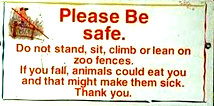Some people misunderstood me when I suggested local governments might have better things to do than require quick service restaurants like Burger King, McDonald's, and Wendy's to post calorie counts on their menu boards.
The King County Board of Health can be counted among them. Although the New York City case hasn’t had its day in court, new labeling requirements in King County, Washington, now call for all chain restaurants, those with at least 10 branches nationwide, to list calories, saturated fat, carbohydrates, and sodium in each regular food item they serve.
"The Board of Health is responsible for passing laws to protect the health of the public, and to promote healthy behaviors that improve health and prevent illness," Board of Health Chairwoman Julia Patterson said. "There is no better example of our commitment to residents' health than the legislation passed today that protects us from dangerous trans fats and promotes consumer education and informed choices by labeling menus."
May I offer another suggestion? Do what they do in the United Kingdom (as illustrated above) and force these restaurants to say what you mean: “eating large quantities of food may lead to obesity.”
Before you think I am only being sarcastic, CPSI and Public Citizen say almost exactly that in the subhead of their release, which touts who has joined them in “support of rule to combat obesity epidemic,” after they filed a friend of the court brief in the U.S. District Court for the Southern District of New York supporting New York City’s Board of Health against a lawsuit filed in June by the New York State Restaurant Association.
“The stakes in this lawsuit are high,” said Deepak Gupta, a lawyer at Public Citizen who wrote the brief, according to the release. “A victory for New York City’s law could help clear the way for similar laws throughout the country.”
But will it really solve the so-called obesity epidemic? As James Vesely points out in his humorous (or maybe tragic) column in the Seattle Times, “Yoder, whose place is popular with knowledgeable diners and serves as many calories as the next guy, is exempt from the calorie count on his menus — it depends on how many eateries you operate. So Anthony'sHomePort is not exempt, but along Shilshole's watering spots, Ray's Boathouse next door is exempt. Same calories, different menus. A menu at Denny's will be draped with calorie numbers; the one at Metropolitan Grill will not.”
Vesely then says that the new, calorie-clad menus are not going to be popular, or particularly useful. I agree. Despite all the money spent on lawsuits (money that could be applied to consumer education about a healthy diet), consumers are likely to tune them out.
Sometimes we tune them out for good reason (besides the occasional chuckle): Sainsbury’s peanuts warns us that they contain nuts; an American Sears hairdryer warns us it is not to be used while sleeping; and, one of my personal favorites, found on a blanket: not to be used as protection from a tornado.
So please forgive me if I do not feel any safer knowing that 20 states, cities, and counties are considering legislation or regulations that would require fast food and other chain restaurants to provide calories and other nutrition information on menus and menu boards.
The most obvious truth is, when you get past all the spin on an issue like this, the snack, cookie, and soda aisles at our local grocery stores take up the most space for a reason. They're yummy.

The King County Board of Health can be counted among them. Although the New York City case hasn’t had its day in court, new labeling requirements in King County, Washington, now call for all chain restaurants, those with at least 10 branches nationwide, to list calories, saturated fat, carbohydrates, and sodium in each regular food item they serve.
"The Board of Health is responsible for passing laws to protect the health of the public, and to promote healthy behaviors that improve health and prevent illness," Board of Health Chairwoman Julia Patterson said. "There is no better example of our commitment to residents' health than the legislation passed today that protects us from dangerous trans fats and promotes consumer education and informed choices by labeling menus."
May I offer another suggestion? Do what they do in the United Kingdom (as illustrated above) and force these restaurants to say what you mean: “eating large quantities of food may lead to obesity.”
Before you think I am only being sarcastic, CPSI and Public Citizen say almost exactly that in the subhead of their release, which touts who has joined them in “support of rule to combat obesity epidemic,” after they filed a friend of the court brief in the U.S. District Court for the Southern District of New York supporting New York City’s Board of Health against a lawsuit filed in June by the New York State Restaurant Association.
“The stakes in this lawsuit are high,” said Deepak Gupta, a lawyer at Public Citizen who wrote the brief, according to the release. “A victory for New York City’s law could help clear the way for similar laws throughout the country.”
But will it really solve the so-called obesity epidemic? As James Vesely points out in his humorous (or maybe tragic) column in the Seattle Times, “Yoder, whose place is popular with knowledgeable diners and serves as many calories as the next guy, is exempt from the calorie count on his menus — it depends on how many eateries you operate. So Anthony'sHomePort is not exempt, but along Shilshole's watering spots, Ray's Boathouse next door is exempt. Same calories, different menus. A menu at Denny's will be draped with calorie numbers; the one at Metropolitan Grill will not.”
Vesely then says that the new, calorie-clad menus are not going to be popular, or particularly useful. I agree. Despite all the money spent on lawsuits (money that could be applied to consumer education about a healthy diet), consumers are likely to tune them out.
Sometimes we tune them out for good reason (besides the occasional chuckle): Sainsbury’s peanuts warns us that they contain nuts; an American Sears hairdryer warns us it is not to be used while sleeping; and, one of my personal favorites, found on a blanket: not to be used as protection from a tornado.
So please forgive me if I do not feel any safer knowing that 20 states, cities, and counties are considering legislation or regulations that would require fast food and other chain restaurants to provide calories and other nutrition information on menus and menu boards.
The most obvious truth is, when you get past all the spin on an issue like this, the snack, cookie, and soda aisles at our local grocery stores take up the most space for a reason. They're yummy.





















